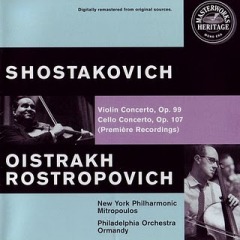Dmitri Shostakovich – Violin Concerto Op.99 Cello Concerto Op.107 (1998)
Shostakovich – Violin Concerto Op.99 Cello Concerto Op.107 (1998)

1. Concerto for Violin and Orch No. 1 in A minor, Op. 99 - I. Nocturne, Adagio
2. Concerto for Violin and Orch No. 1 in A minor, Op. 99 - II. Scherzo, Allegro non troppo
3. Concerto for Violin and Orch No. 1 in A minor, Op. 99 - III. Passacaglia, Andante
4. Concerto for Violin and Orch No. 1 in A minor, Op. 99 - IV. Burlesca, Allegro con brio
5. Concerto for Cello and Orch No. 1 in E flat major, Op. 107 - I. Allegretto
6. Concerto for Cello and Orch No. 1 in E flat major, Op. 107 - II. Moderato
7. Concerto for Cello and Orch No. 1 in E flat major, Op. 107 - III. Cadenza
8. Concerto for Cello and Orch No. 1 in E flat major, Op. 107 - IV. Allegro con molto
David Oistrakh: violin
New York Philharmonic
Dimitri Mitropoulos – conductor
Mstislav Rostropovich: cello
Philadelphia Orchestra
Eugene Ormandy – conductor
Sony has brought together Shostakovitch's greatest concertos in first recordings made soon after their American premieres by the artists most closely identified with them. Neither performance has been bettered, though some, such as Vengerov's Teldec Violin Concerto, come close. The Violin Concerto is in solid, detailed mono; the Cello Concerto in fine stereo. Oistrakh goes to the heart of the violin work, playing with extraordinary tonal magnificence and emotional power. He's matched by Mitropoulos, whose identification with the score is apparent. Rostropovitch is as good in the Cello Concerto, getting excellent support from Ormandy's Philadelphians. Both performances share the white heat of fresh discovery and have stood the test of time to become classic recordings. --Dan Davis, amazon.com
Shostakovich had the great good fortune to write for Russia’s finest soloists, who also happened to be the among world’s best. David Oistrakh remade the First Violin Concerto with the composer’s son on the podium (EMI), but he never bettered this singularly intense performance from 1956, captured in excellent mono sound. Mitropoulos had a particular gift for contemporary music, especially of the nervous and twitchy sort, and that describes the Shostakovich to a tee, at least in the quick movements. That said, the pungent spikiness of the scherzo and finale, yield to this noble but always propulsive account of the great third movement passacaglia, followed immediately by Oistrakh’s alternately probing and brilliant cadenza.
The same qualities of idiomatic musical ownership describe Rostropovich’s first official recording of the First Cello Concerto, which was supervised by the composer in Philadelphia right after the work’s U.S. premiere. One of the more striking aspects of this performance is the moderate tempo of the opening movement. It makes us realize just how dependent on the actual sound of the cello the music really is, and how much confidence Shostakovich placed in Rostropovich, who pours out the tone unstintingly and quite literally sustains the entire movement. The expressive power he brings the second subject is unforgettable, but he follows it up with a gorgeous account of the slow movement and a cadenza and finale that remain points of reference for all future performances. Ormandy and the Philadelphia provide accompaniments that amazed the composer, as they should us as well.
The Cello Concerto dates from 1959, and features stereo sonics that have held up very well. It might seem strange to consider these performances “historical,” in the sense that they are not transfers from grotty old 78s or live air checks of dubious provenance, but they are more than half a century old, and if that’s not historical then what is? They are also reference recordings for both concertos, even with so many fine modern versions available (Mullova in the Violin Concerto, Schiff in the two cello concertos, both on Philips).-- David Hurwitz, ClassicsToday.com
download: uploaded yandex 4shared mediafire solidfiles mega zalivalka filecloudio anonfiles oboom
Zmieniony (Piątek, 09 Maj 2014 11:02)








